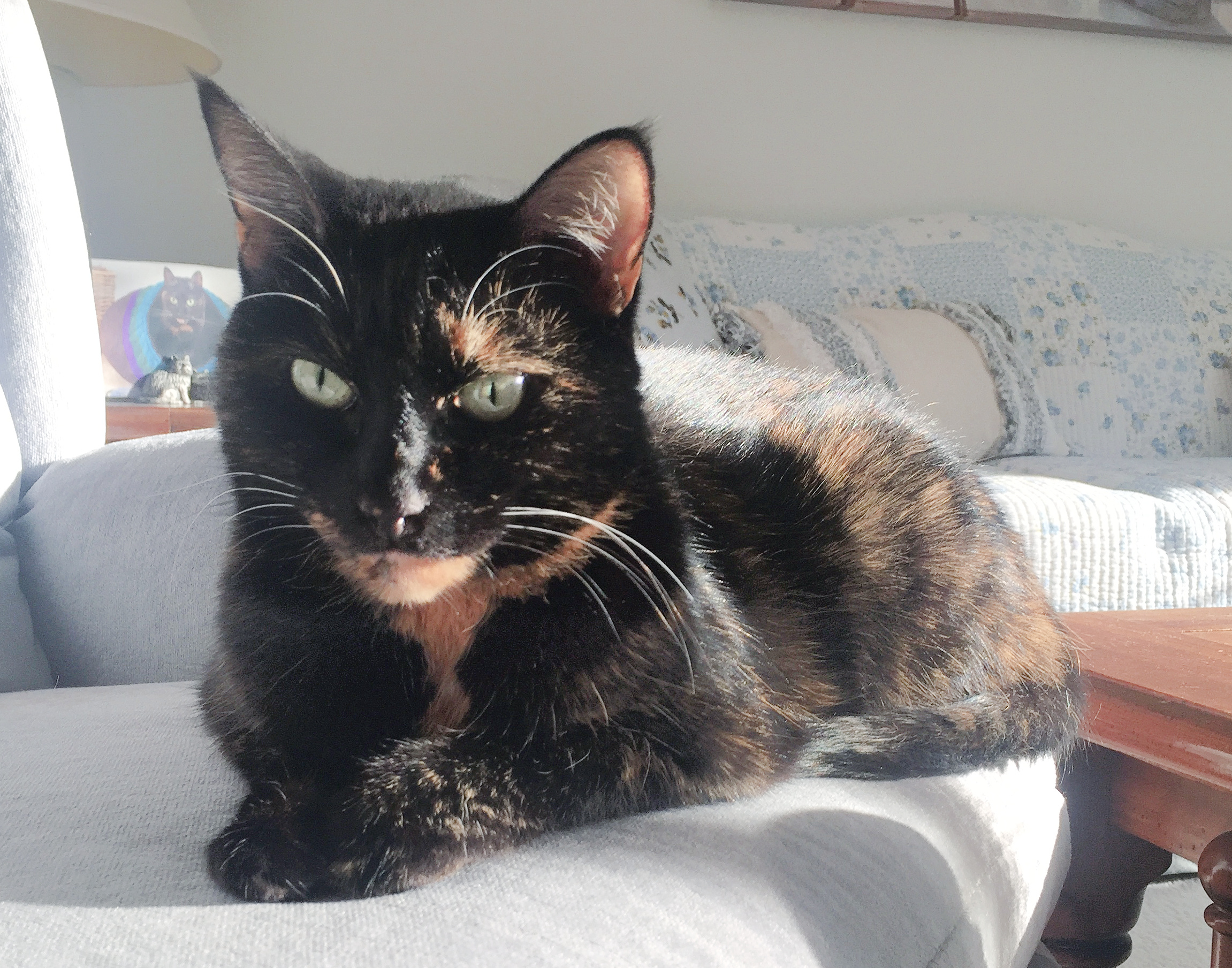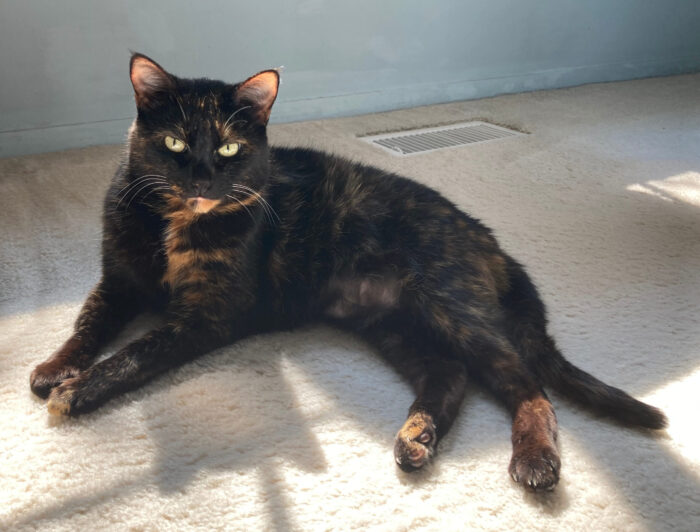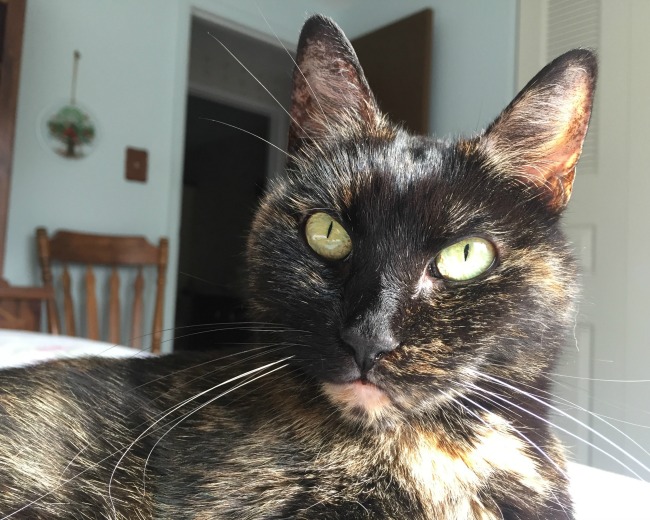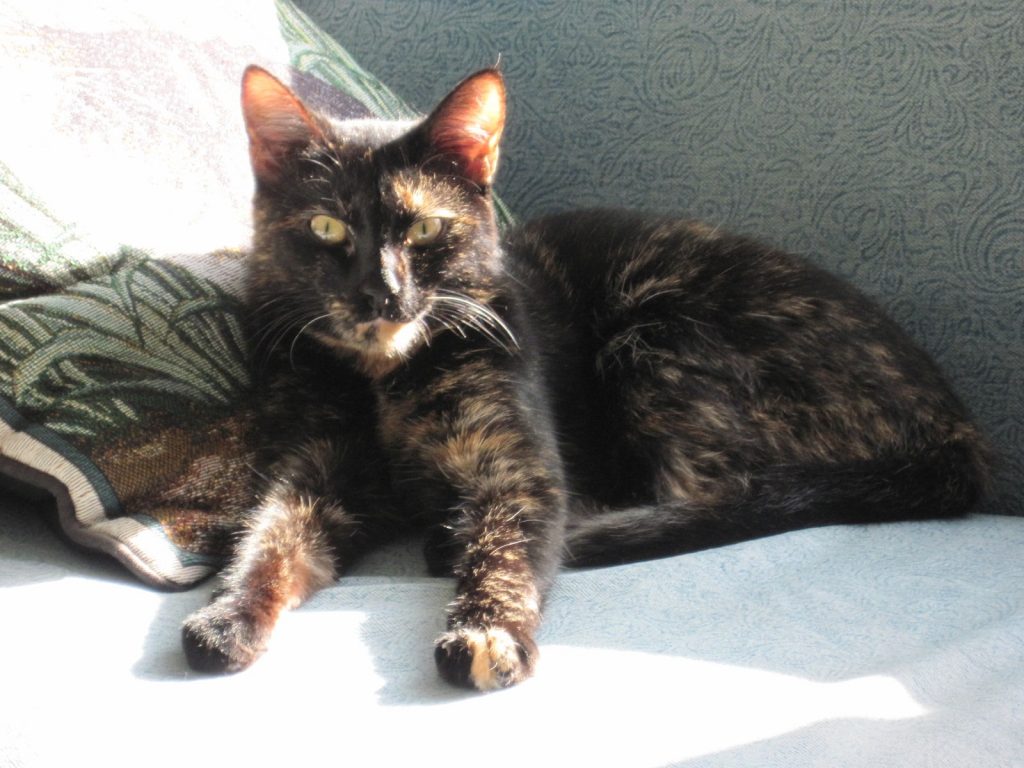
This post contains affiliate links*
Let me start this off by saying don’t be alarmed by the subject line. Allegra is doing just fine. We’ve been dealing with a few ongoing health issues, and I thought it was time to update you.
The bottom line: Allegra is hyperthyroid. This came as quite a surprise to both me and my vet.
Mild, non-specific symptoms
Allegra did not show any of the symptoms typically seen in hyperthyroid cats. She wasn’t losing weight, she didn’t have a voracious appetite, she wasn’t restless or vocalized excessively other than her normal tortie talk. In fact, the mild symptoms she did show pointed to other possible issues. Occasionally, she’d vomit up some water, which I chalked up to her drinking too fast. She had an occasional mild cough. And she was overgrooming. Even though neither my vet nor I were overly concerned with these symptoms, something was clearly not quite right. Since Allegra was happy, playful, affectionate and eating well, we chose a conservative “wait and see” approach.
Last summer, her occasional overgrooming worsened. She had been overgroming on and off for several years, on a small area on her belly. She’d do it for a few months, then she’d stop. But over the summer, that small bald area kept getting bigger. I chalked it up to stress. I thought that she was probably picking up on my stress, and let’s face it, 2020 was probably the most stressful year any of us ever experienced.
My vet did not agree with my theory. In her experience, the majority of cats who overgroom do so because there is an underlying physical cause. ” Whenever I have a patient who is overgrooming her belly, I always look for physical causes, whether it’s pain or allergies,” says Dr. Tasi. “Overgrooming caused by stress typically doesn’t happen on the abdomen, but is more likely to occur on the front legs.” Dr. Tasi added that dermatologists now think that psychogenic overgrooming, the diagnostic term for overgrooming for mental or emotional reasons, was over diagnosed in the past. “Most of these cats are experiencing some sensation such as itching or discomfort that is driving them to overgroom and barber their fur.”
I declined allergy testing. I wasn’t comfortable dropping her off at the curb at a veterinary dermatologist I had never met. Serum allergy testing, which we could have done in home, is not considered reliable in cats. We decided to attempt a food elimination trial to rule out a food allergy, even though that was unlikely. Food allergies more typically manifest as GI symptoms or, when there is a skin component, around the face. Unfortunately, Allegra rejected all the novel proteins and hydrolized protein diets I tried for her. Food elimination trials only work if the cat eats nothing but the novel protein. Clearly, that wasn’t going to happen.
We tried a number of holistic remedies, but Allegra didn’t respond to any of them. She became increasingly itchy. In June, I finally agreed to a short course of steroids. If the steroids stopped the itching and overgrooming, we’d know for sure the cause was physical. If it didn’t, it was stress induced.
After three days on a very low dose of Prednisolone, the itching stopped. We had our answer. As much as I hated the thought of having her on steroids long term, this was a quality of life issue. If anything, I felt guilty for waiting so long to put her on Prednisolone. I don’t think I realized until she stopped just how much time she’d spent every day grooming herself.
Allegra is now on a very low dose of Prednisolone once a day. In addition to stopping the overgrooming, it has also had a positive effect on her occasional vomiting up of water, and her occasional coughing. Both have completely resolved, which tells us that there was systemic inflammation present.
Steroid therapy requires regular bloodwork to monitor any potential adverse effects. We did a full panel in December, after she had been on Prednisolone for about six months. Everything looked beautiful. Except her thyroid, which was elevated. Given her complete lack of hyperthyroid symptoms, this came as a bit of a shock.
Treating Allegra’s hyperthyroidism
There are currently three treatments for hyperthyroidism: medication, surgery, and radiactive iodine (I-131) treatment.
I ruled out surgery immediately. In addition to the risk that comes with any anesthetic procedure, the surgery carries additional risks, including damage to the parathyroid glands located behind the thyroid glands. The parathyroid glands are responsible for maintaining stable blood-calcium levels.
I did not want to have to consider I-131 at this time. Amber went through it in 2005, but she was a completely different cat. She was laid back and mellow, and while the three days she was at Radiocat were the longest days of my life, she did really well. Allegra is a super sensitive little girl, and I don’t think she’d do well in a cage. I also knew that I couldn’t handle her being away from me for three days. Not now, not with Covid, when I’m home all the time with so few distractions available to me.
We started her on methimazole (brand names: Tapazole®, Felimazole®) in December. I was praying that she would tolerate the medication. The most common side effects of this drug include vomiting, anorexia, and tiredness. Other, less common side effects such as gastrointestinal effects and mild changes in blood cell counts are usually temporary and resolve with time. However, a small percentage of cats will suffer severe facial itchiness, and severe changes in blood cell counts, liver disease, and immune-mediated disorders (when the body’s immune system attacks itself.) Thankfully, she showed no side effects, and when we rechecked her labs in January, her thyroid had come back into the normal range.
For a very small number of cats, itchiness can be a symptom of hyperthyroidism. We had hoped that this might be the case for Allegra, and we stopped the Prednisolone once we knew her thyroid was regulated again. Sadly, the itching returned with a vengeance.
Medicating Allegra
So now Allegra gets methimazole twice a day, and Prednisolone once a day. Thankfully, she is easy to pill. I put her quartered and halved pills into an empty gel cap and she lets me pop it right down her throat. I follow this with a creamy treat. Medication should never be given without a chaser of either water, tuna juice, broth or wet food. “Dry pilling” can cause serious damage to the esophageal lining. Allegra has gotten so used to this routine that she will actually demand her medication on days when I run a little behind schedule. Of course, what she really wants is the treat, but it’s still cute when she comes looking for me.
She also gets Aminavast twice a day, which helps support kidney function. It’s a flavorless powder that gets mixed in with her food.
Through all of this, Allegra was and is a happy, playful and affectionate cat. She’s not worried, and I’m trying not to be. We’ll continue to monitor her bloodwork and adjust things as needed. I am beyond fortunate to have a vet who makes house calls so I never had to drop Allegra off at the curb. I’m even more fortunate that my vet is on the same wavelength as I am when it comes to treating Allegra empirically.
As much as I prefer holistic treatments, I’m always open to an integrative approach and never rule out conventional medicine. I’m grateful that my holistic vet feels the same way. Nothing matters more to me than keeping Allegra happy, and while I wish she didn’t have to take two different allopathic medications every day, I’m grateful these drugs are helping her feel good.
I realize that the decisions I’m making about Allegra’s treatment may not be the decisions you might make for your cats in a similar situation. I ask that you respect my choices. We are in the best possible hands with Dr. Tasi. We are always exploring all diagnostic and treatment options before choosing the ones that are best for Allegra, and for me.
As has been the case with all my cats, to me, the most important thing is to not just take care of Allegra’s medical needs, but to honor her unique personality and spirit in every decision I make about her care.
*The Conscious Cat is a participant in the Amazon Services LLC Associates Program, an affiliate advertising program designed to provide a means for us to earn fees by linking to Amazon.com and affiliated sites. The Conscious Cat is an affilliate partner of Chewy.com. This means that if you decide to purchase through any of our links, we get a small commission. We only spread the word about products and services we’ve either used or would use ourselves.





In Oct. I adopted another 12 yr old cat with hyperthyroidism. Bennie, the first (also adopted at 12 yrs old), died after a stroke last summer. We’d had more than 4 lovely years together; she was wonderful company. I had a hip replaced while she was with me and was so grateful for her company. When I decided to look for my next feline roommate, I decided she would be another senior. I’m a senior. I’m also a retired nurse so the diseases / problem which can come with age don’t intimidate me. Lucy is 12 and was at the SPCA when I found her. My home is her third. It took us awhile to get to know each other well enough to get completely comfortable, but we have. She has hyperthyroidism, too. She readily accepts methimazole liquid on her wet food (she only eats wet foods) twice / day. She is the fourth cat of mine whose medications have come from BCP Vet Pharmacy. She takes her methimazole in a beef flavored liquid. (Rosie prefers fish flavored.) When she gets acid stomach trouble she takes medication in a gel into her ear. She’d rather I didn’t do this, but tolerates it well enough for an as needed medication she only needs now and then.
Now I’ve learned something new, Methimazole is the same medication I used for MY hyperthyroidism. I trusted it since it’s been around for over 50 years. Good to know it works for our cats too
It is a human medication, Michelle. Its use in cats is considered “extra-label” which means it’s an approved drug, it just wasn’t specifically approved for use in cats by the FDA.
I’m glad to hear it wasn’t something more serious with Allegra. So glad she is doing better with her medication. Take care, both of you.
My 17 1/2 year old tortie Maggie was diagnosed with hyperthyroid several years ago and at that time we opted to feed her Y/D which seemed to solve the problem for awhile but unfortunately it meant my other cats had to eat Y/D also so she has been on Felimazole for several years now and doing very well. I give it to her with a piller which works well for us. She did lose some weight and has a voracious appetite and she has the louded yowl I’ve ever heard when she feels she’s gone too long without food so I always come running and I love spoiling her. She sleeps a lot too and seems to have problems with her hearing but some of that is probably because of her age. I love when she comes up in the morning when I’m still in bed and snuggles with me. She’s my sweet wonderful and beautiful Mag and I am so in love with her!
My Tommy has tolderated methimazole, he was taking 1/2 pill. I crushed it up in Fancy food. However, she’s had sneezing and drippy eyes and nose for over a month. We tried various things, no luck. So vet gave him a large antibiotic pill, to take 3 times a day. Since I’ve tried crushing that one up, she won’t eat the wet food. So I have to use a pill shooter, which he hates (with water in it). Now she won’t eat the wet food with the crushed up methimazole!! He won’t eat a pill pocket in the food either. I’ll call the vet and get the liquid antibiotic and methimazole.
We went through the same thing with our tortie Samantha. We also took the exact steps in treatment as you are. We wish Allergra the best of health and happiness. You are doing an amazing job tending to her. Great job catmom! Sending love and healing vibes. Purrs
Excuse the autocorrect. The word is Love ❤
Thank you for sharing Allegra’s medical challenges. Sending love & positive energy for you & your precious girl. She is blessed to have you ~ as you are to have her. Thank you for everything you do, for her, cats everywhere & the people who live them ❤
Excuse the autocorrect. The word is Love ❤
Thank you Ingrid for that very informative post, although you did scare the life out of me with your heading! I’m glad Allegra is doing fine but I will keep her in our prayers anyway. Bless you both!
Thank you, Patty and Cricket! I’m sorry we scared you, that’s why I got to the point in the first sentence before getting into details!
Our Toby has hyperthyroid and after his treatment started his weight is up and he is looking sleek with shiny fur. Good post
Thank you for sharing Allegra’s medical challenges. Sending love & positive energy for you & your precious girl. She is blessed to have you ~ as you are to have her. Thank you for everything you do, for her, cats everywhere & the people who live them ❤
We’ll be praying for sweet Allegra and you. She is lucky to have such a great mommy!
Hoping Allegra continues to be happy, affectionate and healthy! She is lucky to have an informed Mommy! Wishing you love and continued strength in your care of her. <3
My Amanda is 17 and almost died from hyperthyroidism. As she can’t be pilled, we tried the cream on the ears which went ok for about a week until she wised up that she was being medicated. We opted then for radiation and it was a winner. She gained back all the weight she had lost and became happy and kitten like again. We adopted her as a feral so she was skittish from the get go. A total personality change now and is a lap cat to both my husband and me, very loving. I am so glad that Allegra is doing well. I enjoy your column very much.
Thank goodness that all that is going on is treatable. I love how you decide your treatment plan based on her personality. Cody was a super easy “piller” too…..he also took Prednisolone (in very low doses) throughout his life, he used to get hot spots occasionally on his ears and in later years developed a slight cough. I am so happy that things are under control with Allegra, I have to say, the title of the post TERRIFIED ME!!! xoxo
I’m glad you solved Allegra’s health problems. Her symptoms were really unusual for thyroid. My Winnie is the third cat I’ve had with hyperthyroidism so I’m very familiar with this condition. One of my late cats cat got radiation. Winnie is now on liquid methimazole but it’s been difficult to find the right dosage so we’re still adjusting the amount. My vet says some cats are like that. Since Winnie is 14 with some kidney issues I’m going to look into the product you mention for kidney support. I hope Allegra continues to do well. You’re an amazing kitty mommy!
Cashew is diabetic and his hyper thyroid was a surprise too. Charlie had that overgrooming. I was never offered a steriod for him. Wish I would of known. I toke him in many times and he was hyper thyroid too.
Allegra is lucky to have such a good and observant momma. I’m glad she’s on a treatment that is working for her.
Great to hear Allegra is fine. Lots of good information.
Grayson, Milo, Hamish & Nan
How do you feel about using Apoquel for treating allergy related itchiness?
We considered it, but neither my vet nor I were comfortable with the potential side effects.
Ingrid: I read.. “She also gets twice a day, which helps support kidney function. It’s a flavorless powder that gets mixed in with her food.” There’s a word missing between “gets” and “twice” so I’m in the dark as to what she gets! 🙂 Love to you and Allegra, hopefully 2021 will be better.
You can’t see the word “Aminavast” in between “gets” and “twice,” Ann? That’s odd, because it’s definitely there, linking to https://amzn.to/2NgSsLU
I can’t see it either Ingrid.
How odd!
I have a “Torti” girl who was 14 last August. Rescued her at 8 weeks from a ferral mom. I’m 78 and retired, she has been a blessing and great company, especially since COVID. Allegra is in my prayers and you as well!
Hi. I have a cat who’s Stage 3 CKD. Do you think the Aminivast would be beneficial? Also, would this be good for my other who has IBD and is Stage CKD?
Oops, IBD and Stage 2 CKD.
Abby, yes, I believe Aminavast would definitely benefit both of your cats. I would discuss it with your vet.
Allegra is fortunate you are so thorough and careful about her health. I’m glad you take such good care of her.